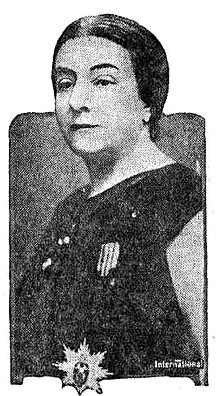Alexandrina Cantacuzino | |
|---|---|
 Cantacuzino, photographed ca. 1925 | |
| Vice President of the International Council of Women | |
| In office 1925–1936 | |
| Delegate of the Kingdom of Romania to the League of Nations | |
| In office 1929–1938 | |
| Personal details | |
| Born | Alexandrina Pallady 20 September 1876 Ciocănești, Ilfov County, Kingdom of Romania (present-day Dâmbovița County, Romania) |
| Died | 1944 (aged 67 or 68) |
| Political party | Iron Guard |
| Spouse | Grigore Gheorghe Cantacuzino (widowed 1930) |
| Children | Gheorghe Cantacuzino (died 1977) Alexandru "Alecu" Cantacuzino (died 1939) |
| Distinctions | Meritul Cultural Order of Queen Marie Order of the Holy Sepulchre Order of St. Sava Croix de guerre Croce al Merito di Guerra |
| Nickname | Didina Cantacuzino |
Alexandrina "Didina" Cantacuzino (née Pallady; also known as Alexandrina Grigore Cantacuzino and (Francized) Alexandrine Cantacuzène; 20 September 1876 – 1944) was a Romanian political activist, philanthropist and diplomat, one of her country's leading feminists in the 1920s and 1930s. A leader of the National Council of Romanian Women and the Association of Romanian Women, she served as Vice President of the International Council of Women, representing the International Alliance of Women, as well as Romania, to the League of Nations. However, her feminist beliefs and international profile clashed with her national conservatism, her support for eugenics, and eventually her conversion to fascism.
Cantacuzino was a member of Romanian nobility, and, after her marriage to the wealthy landowner Grigore Gheorghe Cantacuzino, claimed the title of "Princess". Her elitism and her feminism led her to join the upper-class charity SONFR, of which she became President after World War I. A wartime nurse, she became a herald of war remembrance initiatives (responsible, in large part, for the Mausoleum of Mărășești).
After her involvement with the National Council of Romanian Women, she supported limited women's suffrage within a corporatist framework, losing the support of liberal women, but also building connections with fascist politicians. Cantacuzino's policies within the Association of Romanian Women were mirrored in the legislation of World War II fascist regimes, beginning with the National Renaissance Front.
Sympathetic toward the revolutionary fascist Iron Guard, of which her son Alecu was also an affiliate, Cantacuzino switched her support toward Ion Antonescu's government in early 1941. Having earlier reported to the League of Nations on the damages caused by the Spanish Civil War, she was also critical of Antonescu over the 1941 Odessa massacre. This was her last known public cause. Cantacuzino died, in relative obscurity, not long after Antonescu's downfall.